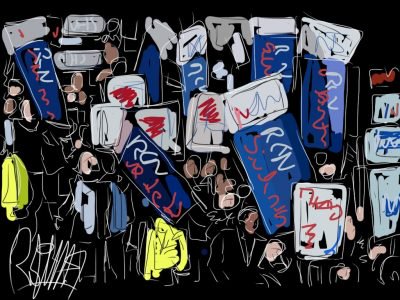Ok, it might be sharp elbows, speedy-boarding and nearly two quid for a bottle of water.
Whichever it is, there will be one thing in common; your safety will be paramount and the ratio of cabin crew-to-passengers will be prescribed in law.
If you are not going on holiday and struggling on, putting your kids in a crèche, you will do so, secure in the knowledge that the ratio of care assistants to children is a matter for the law.
Enjoying the football? If you go to a match, you'll be as safe as you can be, helped by the fact that the ratio of spectators to stewards is a matter of regulation and law.
If yer granny is on a ward in the NHS, the the ratio of nurses to patients is probably decided by the finance department.
Safe staffing is simple enough. Figure out the acuity of patients on the ward, decide what numbers, experience and skill-mix it takes to give the time and space for staff to do their stuff be prepared to flex and Bob's yer uncle.
In California they take safe staffing seriously. It's a matter of law. I think it is in New Zealand? In other parts of the US staff councils decide safe staffing and mandate organisations to deliver it.
Here it seems to be a lottery.
Robert Francis, in his long forgotten mid-Staffs-report placed great emphasis on safe staffing.
NICE were prodded into action. They came up with some daft idea that a ratio of 1:8 might be right, provided somebody could find a red flag and wave it; sending for a box of nurses at three o'clock on a Sunday afternoon or three in the morning on a Wednesday.
Somehow that idea went down the u-bend. There followed a chaotic scramble to pretend safe staffing was still important. Francis, comfortably ensconced as a NED at the CQC sat silent and watched as safe-staffing was swept under the carpet.
There seem to me to be 5 uncomfortable truths: 1. There are not enough nurses to ensure safe-staffing, so let's stop pretending anything proposed to fix it will come from anywhere but the fudge factory.
2. Agency costs ripped-up Trust budgets, pushing them into deficit... so let's stop pretending there is enough money in the system.
3. Deficits were interpreted by Old-Monitor as a failure of management and good men and women left leadership roles... and....
4. The shortage of nurses was interpreted by the CQC as a failure of management and good men and women ditto ... so let's stop pretending regulation can fix this.
5. Cuts to training budgets means not enough home grown nurses will be in the system, for years... so let's stop pretending HEE can get a real handle on this.
Now there is a new palaver. Unearthed by Shaun Lintern in the excellent HSJ (Link below), Not-Monitor are going to take over the task. Good luck.
By the way; a lorry driver can't drive for more than 9 hrs a day and an airline pilot is limited to about 1,300 hours flying a year but a nurse can work three, 12 hour shifts, back-to-back and put in a couple of shifts at a care home and no one bats an eyelid.
Safe-staffing... really?
Nursing is our frontline, the shop window, the production line, the face of joy, laughter and grief. Bereavement, bewilderment, sadness and relief. How have nurses become so neglected, so overlooked and under valued?
What carelessness are we complicit in that we can treat this profession with such nonchalance?
Not-Monitor has deftly reorganised the NHS. Can they find a way of getting the dead hand of politics and management away from safe staffing ratios?
Self directed teams are a seductive option. Buurtzorg do it in the community, I see no reason why a hospital ward cannot?
Can they find a way to overcome the resistance to rota-planning software?
Can they find a way to protect the front line, fund it properly and make it fun to work there?

